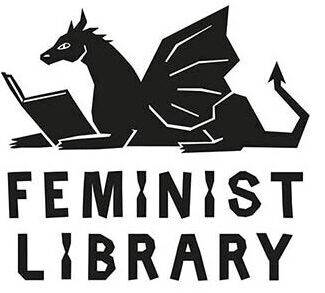Encountering the Feminist Library
 Encountering the Feminist Library. One Latin American’s Chronicle
Encountering the Feminist Library. One Latin American’s Chronicle
By Jael da la Luz
Being a migrant woman in a country where you lack friends or family networks, and you have to “start your life from scratch” is not easy. This is especially true if the country to which you arrive does not share the cultural heritage, language or customs. I was one of those migrants who did not want to leave their country, but “destiny” and love made me come.
Sometimes, the integration process can be filled with tension. But I think we have to risk exploring new spaces even if the migration landscape is very adverse, as it was in my case. To be in the UK, even though my husband was born in this country, I was twice denied a spouse visa while in Mexico, by a government claiming my husband did not have enough money to support me. After waiting for 20 months, depressed, tired and desperate to be reunited with my family, I decided to go on a hunger strike outside the British Embassy in Mexico. After a week of sleeping outside and getting up every morning with my banner, the ambassador received me. After a month of campaigning, I was given the visa and returned to London. My thought upon arrival was: “I have to find a place to heal myself from this traumatic experience.” As a lover of books and a feminist, I went looking for the right place.
I decided to speak to the Feminist Library and ask to be a volunteer because friends had told me that one of the ways to join a community is by volunteering. My first visit was one afternoon in February 2016. Sarah O’Mahoney and Caroline Smith – both writers and co-workers – welcomed me warmly without asking questions. Sarah introduced me to Anne Perez, saying that she also spoke Spanish. Anne is a Basque girl who at that time studied English and then returned to Bilbao. With her I made my first tour: the collection room houses newsletters, magazines, pamphlets, fanzines, posters, brochures, gazettes and all kinds of documents in various languages related to second wave feminist movements – those characterized by its radical nature in health, sexuality, environment, anti-nuclear activism and pacifism. Then we went to the next room which is where more than 5,000 books are covered in shelves. The other room is the offices where in corners, walls and windows there are symbols, badges and material objects that other libraries, groups and feminist artists have donated after closing their doors due to lack of resources. There is another room on the same floor: it is 101, a room where there is still material to be catalogued and displayed, but which, because of staff shortages, had not yet been achieved.
I arrived at the Feminist Library just when their future in Westminster Bridge Road was uncertain, due to a rent increase. Being in a key central London location, on the border of Southwark and Lambeth, the gentrification process is dismantling many community spaces. Local bookstores, self-managed cinemas and social minority markets are all under threat, especially those serving people of colour and grassroots women’s organizations.
On a chilly February evening, with my first English classes under my belt, I joined the campaign to save our communities and to save the Feminist Library! During the demonstration outside the town hall, I saw for the first time outside the offices of the Feminist Library, women from other backgrounds: Asian, Middle Eastern and African diaspora women, using the megaphone to share the experience of how the Library’s collection helped doctoral theses, research articles, literary creation and elaboration of fanzines.
After publicly giving reasons why not to close the library, each of the protesters took our favourite book to read aloud, while inside, council officials had an audience with a deputation from the Library. I was carrying the book by Chimamanda Ngozi Adichie, We Should All Be Feminists, and read aloud. Around me, others read Virginia Woolf, Alice Walker, Caitlin Moran, and others I cannot remember now. Minna, carried a replica of that walking bookseller who has immortalized himself in a vintage postcard. It was a performative act that made me reflect on the phrases that sometimes we say: “The revolution will be feminist or it will be nothing”, “More sisterhood, less competitiveness”, etc. But they were personal, silent reflections; I had so much to say, so much to share, but I was there, unable to express with words in English everything that experience provoked within me … the estrangement that feels like being sister and yet foreigner. What would Andre Lorde have said?
Today it has been a little over a year since the Feminist Library became part of my life in London. It is a space where I have found some of my favourite authors like Chicana writer Sandra Cisneros; Poems by Audre Lorde, by Rosario Castellanos; translations of the works of Elena Poniatowska and Clarice Lispector, and classics of feminist theory and fiction, but now I have the option of deciding who to read and who to feed. What is interesting from this experience in the Feminist Library I have not been asked for my identity, but quite the opposite: having access to different materials helps to have a critical position, politicize the language, and give visibility to what is out there, hidden, but not forgotten. And so, little by little I am recovering writers who did not make London their home, but who came here, and often smiles and tears let me feel accompanied.
